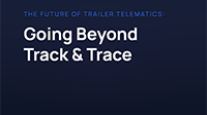Volvo to Partner With Telogis, Trimble to Offer Fleet Management Technology
This story appears in the March. 18 print edition of Transport Topics.
NASHVILLE, Tenn. — Volvo Trucks said it will collaborate with telematics providers Telogis and Trimble Navigation Ltd. in a move that could give rise to factory-installed fleet management technology in the heavy-duty truck market.
Volvo said on March 11 it has separate memorandums of agreement with the two technology vendors to develop fleet management capabilities for its trucks. This collaboration builds upon the data captured by Volvo’s remote diagnostics platform, which the company now offers as standard on all of its trucks equipped with Volvo power.
David Pardue, vice president of aftermarket business development at Volvo, said these agreements “extend our telematics capabilities so that customers have the option to select a fleet management service that leverages Volvo’s integrated connected vehicle platform.”
He and other Volvo representatives said the company wasn’t ready to announce what specific types of fleet management applications it might offer.
Some of the fleet management services available from Telogis and Trimble include GPS fleet tracking, compliance applications such as hours of service, as well as driver safety and fuel-efficiency applications.
The agreement with Trimble pertains primarily to its PeopleNet Communications Corp. unit, a provider of electronic onboard recorders, said PeopleNet President Brian McLaughlin.
He said most of the focus thus far has been on PeopleNet, but the agreement does not preclude the parties from broadening its scope to other Trimble businesses — TMW Systems and ALK Technologies.
Susan Heystee, executive vice president of worldwide sales at Telogis, said the collaboration will enable the Telogis Fleet platform to leverage the data collected by Volvo’s remote diagnostics.
“This now moves us into the area of providing [original equipment manufacturer] telematics with Volvo and really leveraging the capability they have in market with remote diagnostics but taking it much further in providing a full telematics platform,” she said.
Heystee said Telogis is in the process of formulating that fleet-management offering, which will include telematics as well as safety and compliance applications.
PeopleNet’s McLaughlin said he sees a market for both factory-installed telematics services and the aftermarket offerings available today.
“We think some companies want to buy it with the truck. . . . We think some are going to want to buy aftermarket,” he said. “Our focus is really to offer our customers choices.”
Telogis’ Heystee said customers are demanding “factory-fit” connectivity.
“We hear from customers every day,” she said: “Why can’t I just order this with my vehicle? How can we make this simpler?”
The agreement with Volvo is not the first time Telogis has collaborated with an OEM. The company partnered with Ford Motor Co. to develop Ford Crew Chief, a telematics program for fleets using Ford’s light- and medium-duty trucks.
Volvo’s Pardue said his company entered into the collaborative agreements to take advantage of what the fleet-management technology vendors can already do, rather than trying to start from scratch to build those services internally.
McLaughlin, of PeopleNet, said one of the main barriers that has prevented OEM-specific fleet-management services has been the fact that carriers typically buy trucks from many OEMs.
“By working with the telematics providers like us, [OEMs] can really address that situation,” he said. “Hopefully, it’ll set a new standard for the industry.”
The same day it announced its agreements with Telogis and Trimble, Volvo also said it is expanding remote diagnostics to its Volvo VHD and VAH vocational models, making it a standard feature in all of its North American trucks equipped with Volvo engines.
The diagnostics platform, which provides proactive diagnostic and repair planning assistance through analysis of critical trouble codes, has been standard on all Volvo-powered VNM and VNL models since mid-2012. The service is free for two years or 250,000 miles, after which a subscription charge applies.




